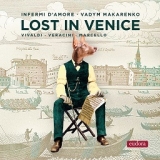(Remy Franck) – Infermi d’Amore sowie die Solisten Vadym Makarenko, Natalie Carducci und Bruno Hurtado Gosalvez spielen Musik von Veracini, Marcello und vor allem Vivaldi, von dem sogar zwei Konzerte und die Sinfonia RV 786 laut dem Label als Erstaufnahmen präsentiert werden.
Der junge ukrainische Geiger Vadym Makarenko und das Ensemble Infermi d’Amore liefern damit eine wichtige Ergänzung der Vivaldi-Diskographie.
Wegen den zudem auch ansprechenden Interpretationen haben wir es mit einer vorbildlich musizierten Barock-CD zu tun. Die Interpreten machen keine Klang-Experimente, sondern verlassen sich ganz auf ein natürliches (aber stets auch intellektuell fundiertes) Empfinden und auf die Technik aller Beteiligten. Die Tempi sind durchwegs eher gemäßigt, so dass sich die prächtige Musik in optimalen Bedingungen entfalten kann. Dabei bleibt sie stets leicht und schwebend, von bestechender Leucht- und intensiver Ausdruckskraft.
Die Aufnahme ist direkt und durchaus angenehm, mit einem soliden Bassfundament, das den hohen Streichern viel Relief verleiht.
Infermi d’Amore and soloists Vadym Makarenko, Natalie Carducci and Bruno Hurtado Gosalvez perform music by Veracini, Marcello and especially Vivaldi, from whom even two concertos and the Sinfonia RV 786 are presented as first recordings, according to the label.
The young Ukrainian violinist Vadym Makarenko and the Ensemble Infermi d’Amore thus provide an important addition to the Vivaldi discography.
Because of the moreover also appealing interpretations we have to do with an exemplarily played baroque CD. The performers make no experiments, but rely entirely on a natural (but always intellectually grounded) sensibility and on the technique of all involved. The tempos are rather moderate throughout, allowing the magnificent music to unfold in optimal conditions. At the same time it always remains light and fluid, of captivating luminosity and intense expressiveness.
The recording is direct and thoroughly enjoyable, with a solid bass foundation that gives the high strings plenty of relief.
(Guy Engels ) – Sich in Venedig zu verlieren, ist nicht allzu schwer. In dem großen Labyrinth von Kanälen, engen Gassen und zahlreichen Brücken hat man sich schnell verlaufen – was nicht unbedingt ein Nachteil sein muss. Immerhin entdeckt man derart oft pittoreske Plätze und historische Gebäude.
Der Titel Lost in Venice für das neue Album des Ensembles Infermi d’Amore ist also durchaus passend, da es den Musikern um verlorene und wieder aufgetauchte musikalische Schätze Venedigs geht. Für diese Aufnahme sind das vorwiegend Ersteinspielungen von Werken von Antonio Vivaldi, von dem man ja gemeinhin denkt, es sei schon alles bekannt.
Infermi d’Amore – was soviel wie krank vor Liebe bedeutet – hat definitiv seinen Spaß, seine Freude an der Musik Vivaldis, Veracinis und Marcellos. Es geschieht immer etwas in den Werken – auch in den langsamen Sätzen. Vor allem die dramaturgisch klug platzierten Rubati, das intuitive Spiel mit Tempi und Dynamik sorgen für ständige Bewegung und nie nachlassende Energie. Das muntere Hin und Her von Rede und Widerrede, gepaart mit einem perfekten kammermusikalischen Gestus stellt überdies eine ideale Balance von Klang und Rhythmus her.
Getting lost in Venice is not too difficult. In the large labyrinth of canals, narrow streets and numerous bridges, it is easy to get lost – which is not necessarily a disadvantage. After all, this is how you often discover picturesque squares and historic buildings.
The title Lost in Venice for the new album of the ensemble Infermi d’Amore is thus quite appropriate, since the musicians are concerned with lost and resurfaced musical treasures of Venice. For this recording, these are primarily premiere recordings of works by Antonio Vivaldi, of whom one generally thinks everything is already known.
Infermi d’Amore – which means sick with love – definitely has its fun, its joy in the music of Vivaldi, Veracini and Marcello. There is always something happening in the works – even in the slow movements. Above all, the dramaturgically cleverly placed rubati, the intuitive play with tempi and dynamics ensure constant movement and never flagging energy. Moreover, the lively back and forth of speech and backtalk, coupled with a perfect chamber music gesture, establishes an ideal balance of sound and rhythm.
























